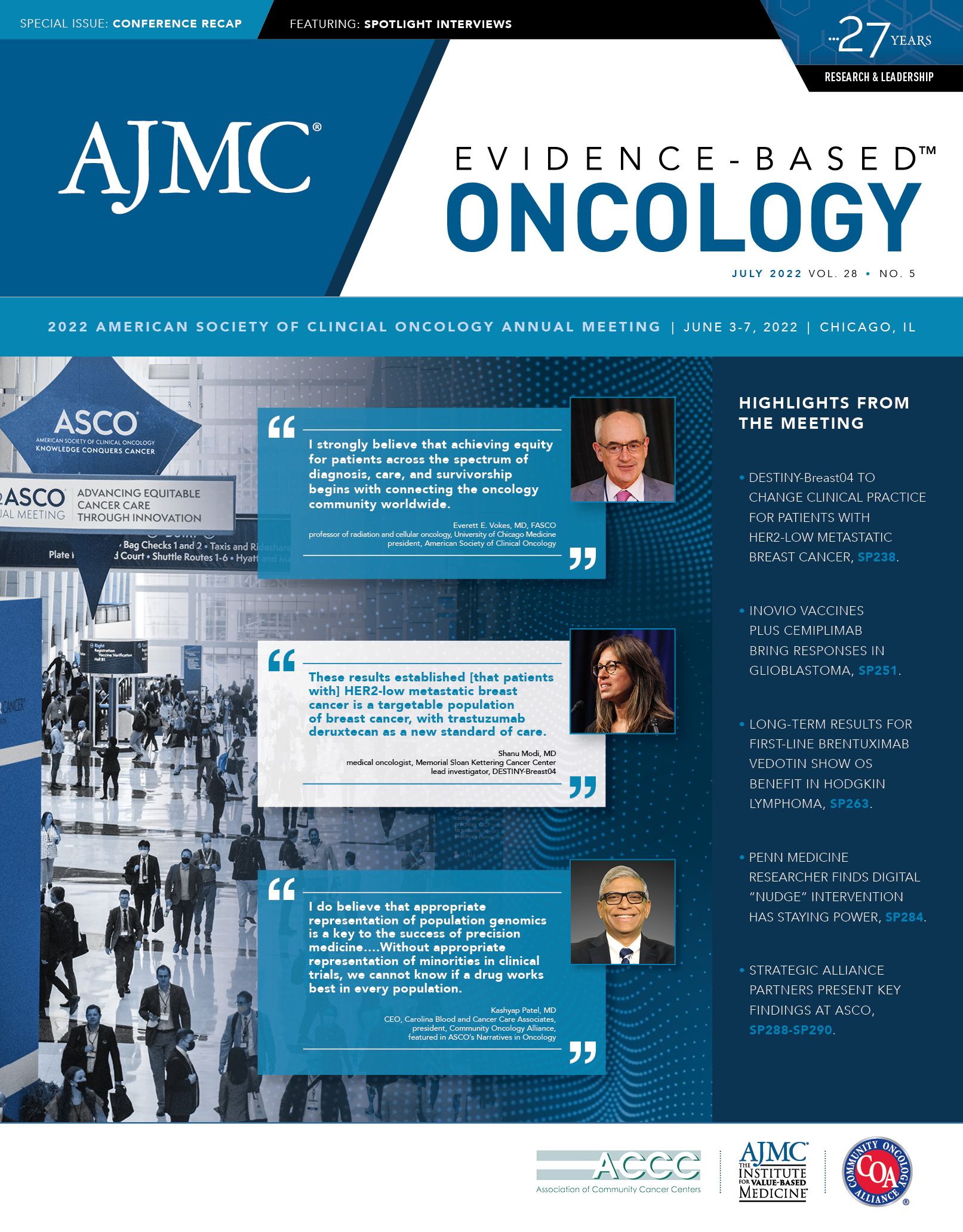- Center on Health Equity & Access
- Clinical
- Health Care Cost
- Health Care Delivery
- Insurance
- Policy
- Technology
- Value-Based Care
Dosing Study of Modakafusp Alfa Shows Promise in Solid Tumors; Tests Planned With Checkpoint Inhibitors
For all the advances in cancer care, great unmet need remains. Investigators continue to search for new therapies that more precisely target tumors with less toxicity. During the 2022 Annual Meeting of the American Society of Clinical Oncology (ASCO), a leading investigator from Sarah Cannon Research Institute in Nashville, Tennessee, presented results from a phase 1b/2 dose escalation study (NCT04157517) of modakafusp alfa, a first-in-class immune-targeting attenuated cytokine, which was tested in patients with a variety of solid tumors.
Melissa L. Johnson, MD, who is program director of lung cancer research at Sarah Cannon and a medical oncologist with Tennessee Oncology, explained how modakafusp alfa consists of 2 interferon alpha 2b (IFNα2b) molecules that are genetically fused to the to the Fc portion of a humanized anti-CD38 IgG4 monoclonal antibody. Modakafusp alfa, which is being developed by Takeda Oncology, had previously demonstrated antitumor activity in mouse models.
Because of the way IFNα2b behaves, dosing is extremely important: the attenuated molecules seek out the CD38+ cells, triggering immune responses. “Upregulation of CD38 in the tumor microenvironment has been shown to be a mechanism of acquired resistance to treatment with anti-PD-1 or anti-PD-L1 inhibitors in solid tumors,” Johnson said.
“Thus, this increased CD38 target expression could enable increased modakafusp binding and therefore, increased interferon pathway activation in the tumor microenvironment, where it could be most beneficial for eliciting antitumor responses,” she said.
The study’s primary objective was determining safety and tolerability for modakafusp alfa. Secondary objectives included (1) defining a maximally tolerated dose and (2) evaluating pharmacokinetics and immunogenicity.
Results. Adult patients with advanced or metastatic solid tumors received modakafusp alfa intravenously on day 1 of a 21-day cycle. Dose escalation started at 0.1 mg/kg. A total of 21 patients were dosed in the escalation phase at 0.1 (n = 3), 0.2 (n = 3), 0.4 (n = 3), 0.75 (n = 3), 1.0 (n = 3), and 1.5 mg/kg (n = 6) once every 3 weeks. Two patients experienced dose-limiting toxicities during cycle 1 at 1.5 mg/kg; 1 patient with baseline bone infiltration had grade 4 thrombocytopenia and 1 patient had grade 3 confusion.
Across all dose levels, patients had received a median of 2 treatment cycles (range, 1-11) as of November 2021. Modakafusp alfa treatment-related adverse events (TRAEs) were reported in 81% of patients; these included infusion-related reactions (52.4%), chills (47.6%), and nausea (33.3%). TRAEs of grade 3 or higher were reported in 42.9% of patients and included neutropenia (14.3%) and hypertension (9.5%).
There was an increase in greater than dose-proportional exposure in the 0.1-1.5 mg/kg dose range, with no exposure accumulation after each dose every 3 weeks. Pharmacodynamic data suggested saturation of the IFN pathway modulation at greater than 0.2 mg/kg in the peripheral blood, with duration of modulation increasing with each dose.
Among the 14 response-evaluable patients, 7 had a best response of stable disease, including 1 with cutaneous melanoma who had 21% target lesion reduction. Johnson said there was also a patient with anal cancer who had target lesion shrinkage. “Modakafusp alfa had a manageable safety profile in the dose range 0.1 to 1.5 mg/kg in patients with solid tumors. Proof of mechanism was validated,” the investigators concluded. They recommended the phase 2 dose at 1.0 mg/kg every 3 weeks. The next round of studies will test modakafusp alfa with a checkpoint inhibitor in selected tumor types.
Reference
Johnson ML, Abdul-Karim R, Sommerhalder D, et al. Dose escalation of a phase 1b/2 study of modakafusp alfa, an immune-targeting attenuated cytokine, in patients (pts) with metastatic solid tumors. J Clin Oncol. 2022;40(suppl 16):2503. doi:10.1200/JCO.2022.40.16_suppl.2503

Empowering Children and Parents Through Technology: Opportunities, Challenges, and Future Directions
January 15th 2026Digital health platforms improve pediatric care by offering customized, interactive tools for children and parents. They enhance education, support, and engagement while tackling challenges related to access, usability, and privacy.
Read More
